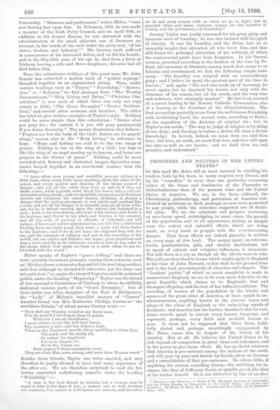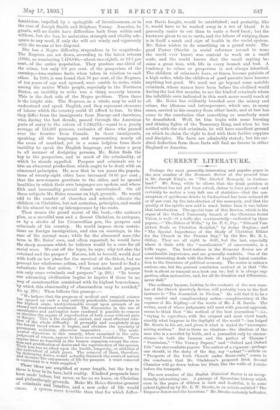PRISONERS AND PAUPERS IN THE UNITED STATES.*
IN this wprk Mr. Boies will at least succeed in startling his readers, both by his facts, in many respects very dismal, and by his " remedies," in more than one particular savouring rather of the times and tendencies of the Pharaohs or Nebuchadnezzar than of the present time and the United States of America. We see, in the facts adduced, the Christianity, philanthropy, and patriotism of America con- fronted by problems as dark, perhaps, as ever were presented to any people, while the remedies suggested are of doubt- ful value. We see the criminals and paupers increasing at race-horse speed, outstripping, in some cases, the growth of the population, and to all appearance, setting at naught even the ardent and splendid efforts which are being made, on every hand, to grapple with the ever-increasing danger. That those efforts are indeed gigantic, is written on every page of this book. The money spent on reforma- tories, penitentiaries, jails, and similar institutions, not to speak of schools and religious influences, is enormous. Yet still there is a cry as though all the efforts were in vain. The jails are described in terms which might apply to England in the time of John Howard, rather than to the present time and to the land pre-eminently of churches and chapels. The "Justices' justice," of which so much complaint is made in monarchical England, we see to be even more defective in the great Republic which claims to be England's best and strongest offspring, and the heir of her loftiest traditions. The crowding of masses of the population in the blocks and squares of the great cities of America, at least equals in un- wholesomeness, anything known in the obscure lanes and alleys of the cities of England or the uninviting wynds of Scotland ; and America has the further drawback that its vast, dense crowds speak in almost every known language, and represent, perhaps, every faith and no-faith known to men. It must not be supposed that these facts, faith- fully stated and perhaps unwittingly exaggerated by Mr. Boies, cause him to despair of the future of his country. .Not at all. He believes the United States to be rich beyond all comparison in great ideas and influences, and in the power to give them effect. He has no doubt whatever that America is pro-eminent among the nations of the earth, and will, year by year and decade by decade, show an increase and a consolidation of that pre-eminence. He allows little, if anything, for certain retarding forces,—for ambition, for in- stance, like that of Jefferson Davis, or ignoble greed, like that of the traitor Arnold. He is not disturbed by fear of another * Pritoners and Paupers: a Study of the Abnormal Renat; of Criminate, and the PubLie Burden of Pauperism on the United Statoo; the Cause, anal Remedies. By Houry M. Boles, M.A. London and New York: 431, P, Putnam'P. Sons. 1893.
fanaticism, impelled by a springtide of licentiousness, as in the case of Joseph Smith and Brigham Young. America, he grants, will no doubt have difficulties both from within and without, but she has, he maintains, strength and vitality ade- quate to any need, if only she will act wisely and vigorously with the means at her disposal.
She has a Negro difficulty, stupendous in its magnitude. The Negroes are set down, according to the latest returns (1880), as numbering 7,470,040,—about one-eighth, or 13.5 per cent., of the entire population. They produce one-third of the crime, but only 8.8 per cent. of the pauperism of the country,—two curious facts, when taken in relation to each other. In 1880, it was found that 70 per cent. of the Negroes, of ten years of age and upward, were unable to write, while among the native White people, especially in the Northern States, an inability to write was a thing scarcely known. This is the dark side of the Negro problem. Then there is the bright side. The Negroes, as a whole, may be said to understand and speak English, and they represent elements of labour which the country could ill afford to lose. In this they differ from the immigrants from Europe and elsewhere, who, during the last decade, passed through the American ports of entry to the extent of 5,246,613,—equal to a yearly average of 524,661 persons, exclusive of those who passed over the frontier from Canada. In these immigrants, speaking all the languages, and representing nearly all the races of mankind, yet in a sense helpless from their inability to speak the English language, and hence a prey to all manner of designing persons, Mr. Boies finds the key to the pauperism, and to much of the criminality, at which he stands appalled. Paupers and criminals are to him an abnormal production, which ought to be dealt with on abnormal principles. He sees that in ten years the popula- tions of twenty-eight cities have increased 44.80 per cent.; that the new-comers gravitate to the cities, and to special localities in which their own languages are spoken, and where filth and immorality prevail almost unrestrained. On all these subjects Mr. Boies reasons on high grounds. He would add to the number of churches and schools, educate the children on Christian, but not sectarian, principles, and would do his utmost to cut up intemperance by the roots.
Then comes the grand secret of the book,—the author's plan, as a merciful man and a devout Christian, to extirpate, as by a stroke of his Cromwellian pen, the paupers and criminals of his country. He would impose stern restric- tions on foreign immigration, and also on marriage, in the case of the normal man; while for the abnormal man (the term is Mr. Boles' own, and often repeated) he would have the sharp measure which he believes would be a cure for all social woes. We out off the leper, he says ; why not also the criminal and the pauper ? Nature, left to herself, would deal with both on her plans for the survival of the fittest, but we prevent her wholesome action, and hence are bound to find a substitute for that action. " From criminals and paupers can only come criminals and paupers." (p. 268.) "In terror our advancing civilisation begins to inquire if there be no Way of counteraction consistent with its highest benevolence, by which this abnormality of abnormalism may be avoided," (p. 270.) Then follows this passage :- "We believe that the progress of medical and surgical science has opened up such a way entirely practicable, humanitarian in
e highest sense, unobjectionable except upon grounds of an absurd and irrational sentiment. The discoveries in the use of
anteathetics and antiseptics have rendered it possible to remove or sterilise the organs of reproduction of both sexes without pain or danger. This is the simplest, easiest, and most effectual solu- t,1°2, of the whole difficulty. It promptly and completely stops the horrid breed where it begins, and obviates the necessity of ma ent seclusion, otherwise imperative The senti- inatiecital objections to, this remedy, when examined in the calm out of reason, appear to have no sound foundation. These organs have no funetioh. in the human organism except the crea- tion 8,31..d Then. gratification of desire and the reproduction of the species. toss has no effect uon the health, longevity, or abilities of the individual of adult years. The removal of them, therefore, by destroyin d ' and hi,reasegti esiro, would actually diminish the wants of nature is equivalent tfr a enjoyments of life for paupers. A want removed want supplied." These • A them fa- herein its amplified at some length, but the key to before, bare, bald reality. Kindred proposals have been made and phil never, as far as we know, on Christian azthropiee' but of criminals an grounds. Make Mr. Boies director-general d lunatics, and a new order of life would ensue. A system more horrible than that for which Jeffer- son Davis fought, would be established ; and probably, like it, would have to be washed away in a sea of blood. It is generally easier to cut than to untie a hard knot ; but the knots are given to us to untie, and the labour of untying them is in itself a mark and sign of health in the social system. Mr. Boles wishes to do something on a grand scale. The good Pastor Oberlin (a social reformer second to none the world ever knew) was content to work on a small scale, and the world knows that the small sapling be- came a great tree, with life in every branch and bud. A tendency to crime or pauperism is not always inherited. The children of criminals have, at times, become patriots of a high order, while the children of good parents have become anything but good. We need not go beyond some notable criminals, whose names have been before the civilised world during the last few months, to see the kind of criminals whom the infallible cure indicated in this work never would reach at all. Mr. Boies has evidently brooded over the misery and crime, the idleness and intemperance, which are, in many cases, carried to his country from other lands, and at last has come to the conclusion that something or somebody must be demolished. Well, let him begin with some burning and shining lights of the Tammany Ring, and when he has settled with the rich criminals, he will have excellent ground on which to claim the right to deal with their feebler copyists and disciples. His facts are admirably stated ; but his car- dinal deduction from those facts will find no favour in either England or America.



































 Previous page
Previous page